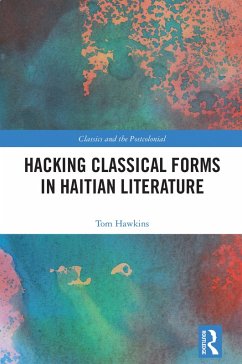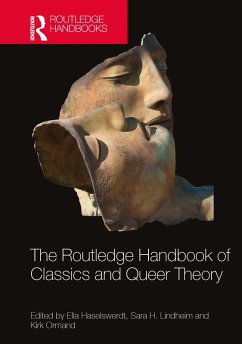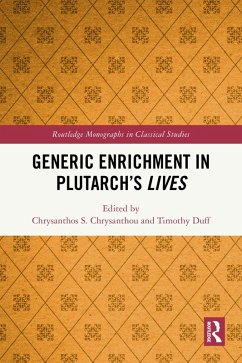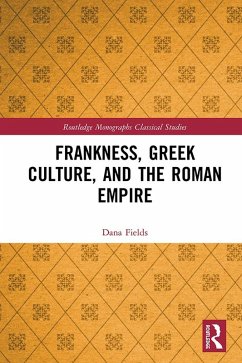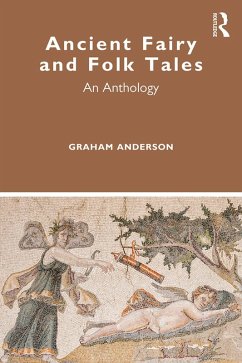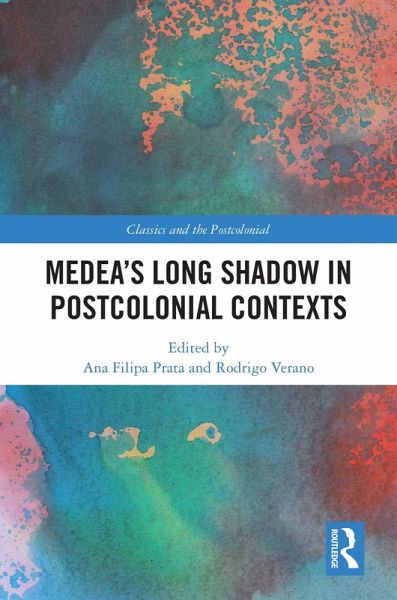
Medea's Long Shadow in Postcolonial Contexts (eBook, PDF)
Versandkostenfrei!
Sofort per Download lieferbar
42,95 €
inkl. MwSt.
Weitere Ausgaben:

PAYBACK Punkte
21 °P sammeln!
This interdisciplinary volume explores the ancient Greek myth of Medea and its global analogues found in other mythic and folk tales of deadly, exiled women, such as those of La Malinche and La Llorona, examining the connections between these figures and their depictions from antiquity to modernity.The book considers the figure of the foreign woman, her exile, fratricide, and infanticide, in its ancient Greek form and in global, postcolonial receptions in a range of media, including drama, film, novels, and the visual arts. The chapters illuminate the contradictions of considering the classica...
This interdisciplinary volume explores the ancient Greek myth of Medea and its global analogues found in other mythic and folk tales of deadly, exiled women, such as those of La Malinche and La Llorona, examining the connections between these figures and their depictions from antiquity to modernity.
The book considers the figure of the foreign woman, her exile, fratricide, and infanticide, in its ancient Greek form and in global, postcolonial receptions in a range of media, including drama, film, novels, and the visual arts. The chapters illuminate the contradictions of considering the classical Medea as a central reference point for analysis of other female figures from peripheral territories, while simultaneously acknowledging the insights that such comparisons can yield. Emphasizing the ways in which Medea's seditious nature enables the establishment of an extensive and heterogeneous intertextual network with other mythic characters who represent a similarly disruptive role in their specific local historical and cultural contexts, the book argues for a comparative analysis that is equally attentive to myths and folk tales from all regions. These essays - by scholars of classics, comparative and world literatures, and postcolonial studies - represent a plurality of perspectives from different academic contexts in Africa, Latin America, North America, and Europe and examine how different cultures have depicted women, foreigners, crime, and abjection. The foundations of Greek myth and subsequently of the classical tradition itself are interrogated from a postcolonial perspective. In tracing the portrayals of Medea and other mythic women through the overlapping features of different female characters and plots, and intertwining local cultural and literary materials with broader debates, this volume challenges Eurocentric narratives of power and cultural domination, and works to decentralize the discussion of Medea from the exclusive domain of classical studies.
Medea's Long Shadow in Postcolonial Contexts will be of interest to students and scholars working on Greek tragedy and its reception, as well as to those studying postcolonial and global approaches to literature, culture, and gender studies.
The book considers the figure of the foreign woman, her exile, fratricide, and infanticide, in its ancient Greek form and in global, postcolonial receptions in a range of media, including drama, film, novels, and the visual arts. The chapters illuminate the contradictions of considering the classical Medea as a central reference point for analysis of other female figures from peripheral territories, while simultaneously acknowledging the insights that such comparisons can yield. Emphasizing the ways in which Medea's seditious nature enables the establishment of an extensive and heterogeneous intertextual network with other mythic characters who represent a similarly disruptive role in their specific local historical and cultural contexts, the book argues for a comparative analysis that is equally attentive to myths and folk tales from all regions. These essays - by scholars of classics, comparative and world literatures, and postcolonial studies - represent a plurality of perspectives from different academic contexts in Africa, Latin America, North America, and Europe and examine how different cultures have depicted women, foreigners, crime, and abjection. The foundations of Greek myth and subsequently of the classical tradition itself are interrogated from a postcolonial perspective. In tracing the portrayals of Medea and other mythic women through the overlapping features of different female characters and plots, and intertwining local cultural and literary materials with broader debates, this volume challenges Eurocentric narratives of power and cultural domination, and works to decentralize the discussion of Medea from the exclusive domain of classical studies.
Medea's Long Shadow in Postcolonial Contexts will be of interest to students and scholars working on Greek tragedy and its reception, as well as to those studying postcolonial and global approaches to literature, culture, and gender studies.
Dieser Download kann aus rechtlichen Gründen nur mit Rechnungsadresse in A, B, BG, CY, CZ, D, DK, EW, E, FIN, F, GR, HR, H, IRL, I, LT, L, LR, M, NL, PL, P, R, S, SLO, SK ausgeliefert werden.





